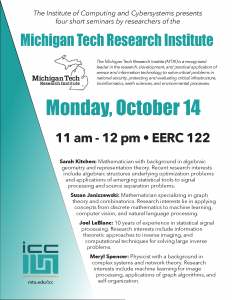 The Institute of Computing and Cybersystems will present four brief seminars by researchers from the Michigan Tech Research Institute (MTRI) on Monday, October 14, 2019, 11:00 a.m. to 12:00 p.m., in EERC 122. MTRI research and outreach focuses on the development of technology to sense and understand natural and manmade environments.
The Institute of Computing and Cybersystems will present four brief seminars by researchers from the Michigan Tech Research Institute (MTRI) on Monday, October 14, 2019, 11:00 a.m. to 12:00 p.m., in EERC 122. MTRI research and outreach focuses on the development of technology to sense and understand natural and manmade environments.
Susan Janiszewski is a mathematician specializing in graph theory and combinatorics. Her research interests lie in applying concepts from discrete mathematics to machine learning, computer vision, and natural language processing. Her talk, “Combining Natural Language Processing and Scalable Graph Analytics,” takes up the fast-growing field of Natural Language Processing (NLP), i.e. the development of algorithms to process large amounts of textual data. Janiszewski will discuss ways to combine common NLP and graph theoretic algorithms in a scalable manner for the purpose of creating overarching computational systems such as recommendation engines or machine common sense capabilities.
Joel LeBlanc has 10 years of experience in statistical signal processing. His research interests include information theoretic approaches to inverse imaging, and computational techniques for solving large inverse problems. LeBlanc’s talk, “Testing for Local Minima of the Likelihood Using Reparameterized Embeddings,” addresses the question: “Given a local maximum of a non-linear and non-convex log-likelihood equation, how should one test for global convergence?” LeBlanc will discuss a new strategy for identifying globally optimal solutions using standard gradient-based optimization techniques.
Meryl Spencer is a physicist with a background in complex systems and network theory. Her research interests include machine learning for image processing, applications of graph algorithms, and self-organization. Her talk, “Computational modeling of collaborative multiagent systems,” will discuss her previous work on modeling self organization in cellular networks, and some areas of interest for future work.
